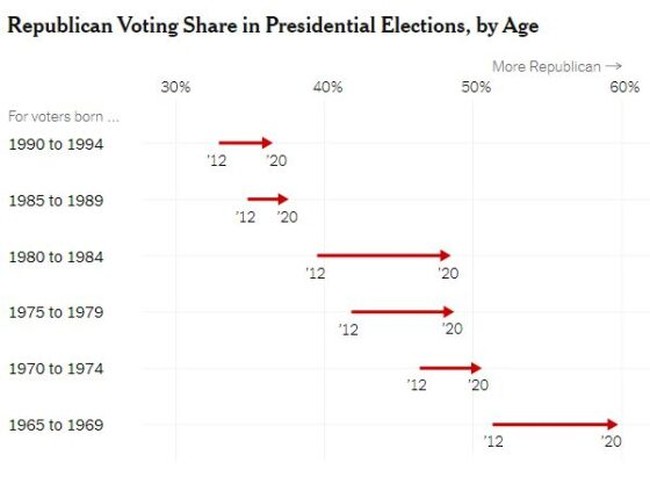This popped up at the NY Times Thursday but I didn’t see it until this morning. It has long been considered a truism that voters move right as they age. But as Nate Cohn points out, there had recently been some studies disputing that claim:
Political folklore has long held that voters become more conservative as they get older. But it is nonetheless at odds with a wave of recent reports or studies suggesting otherwise. The Financial Times, for instance, wrote that “millennials are shattering the oldest rule in politics” by not moving to the right as they age. Similarly, the Democratic data firm Catalist found that Democrats essentially haven’t lost ground among millennials and Gen Z over the last decade. These findings have helped spark a new wave of speculation about whether the long-awaited era of Democratic dominance might this time really be at hand.
Here’s a bit of the Financial Times story he mentioned. This was published back in December.
“If you are not a liberal at 25, you have no heart. If you are not a conservative at 35 you have no brain.” So said Winston Churchill. Or US president John Adams. Or perhaps King Oscar II of Sweden. Variations of this aphorism have circulated since the 18th century, underscoring the well-established rule that as people grow older, they tend to become more conservative.
The pattern has held remarkably firm. By my calculations, members of Britain’s “silent generation”, born between 1928 and 1945, were five percentage points less conservative than the national average at age 35, but around five points more conservative by age 70. The “baby boomer” generation traced the same path, and “Gen X”, born between 1965 and 1980, are now following suit.
Millennials — born between 1981 and 1996 — started out on the same trajectory, but then something changed. The shift has striking implications for the UK’s Conservatives and US Republicans, who can no longer simply rely on their base being replenished as the years pass.
So the FT story isn’t claiming younger people in general have stopped moving to the right, just that millennials seem to have done so. So let’s jump back to Nate Cohn.
But a different story emerges by tracking the same cohort of voters over time, rather than a whole generation with changing composition. The millennials of 2008 are not the same as those of 2016, for instance: Six additional years of even more heavily Democratic millennials became eligible to vote after the 2008 election, canceling out the slight Republican shift among older millennials.
The shift to the right appears largest among the oldest “young” voters — the older millennials who came of age in a very different political era from today. Many of the issues that drew young voters to the Democrats in 2004 or 2008 — like the Iraq War or same-sex marriage — may no longer be issues at all. Republicans may have even reversed their former disadvantage on some issues, whether by sometimes opposing foreign intervention, winning some voters with colorblind messaging on race, or by becoming the “anti-establishment” party.
So it’s probably true that young millennials, those born in the late 80s or early 90s, haven’t moved to the right as much as older millennials but even they have moved. Cohn created this chart.

As you can see, those born in the late 80s seem a lot more resistant to moving right than those born in the early 80s.
The comments on this story are a mix. The top two comments are both people saying they are millennials who will never, ever vote Republican.
I’m 46 and there is really nothing that would get me to vote Republican. And yes, I have a job and own a home.
But there are some commenters who see it differently. This one in particular was really well crafted.
I’m 38. In the words of Ronald Reagan, I didn’t leave the Democratic Party, the Democratic Party left me.
I did (and still do) strongly support gay marriage. But I’ve yet to hear a compelling argument for why biological males have a right to play girl’s sports, or why kids should be “affirmed” psychologically and surgically of a belief that seems quite at odds with reality, or why my kindergartener needs to learn about all of this in school.
I did (and still do) support investments in green technology. But I don’t appreciate coercive nonsense about deadly gas stoves as a way of achieving adoption.
I did (and still do) support legal weed, but I don’t believe every park bench should be a public clambake at 8:00 am.
I, to be honest, never really supported criminal justice reform, and watching crime skyrocket has confirmed my suspicion that it was probably a bad idea.
And watching the vigor with which the left used COVID to institute endless silly rules that never made any difference, and their stubborn refusal to admit they never made any difference, has made me wonder if there is really something to the fear of too much government power.
Generations do move right over time. As with anything else the reasons are probably complicated. There may be a mix of push factors and pull factors at any given moment in time. My guess is that right now, left-wing extremism in the form of identity politics is a big push factor moving people away from the Democratic Party.









Join the conversation as a VIP Member